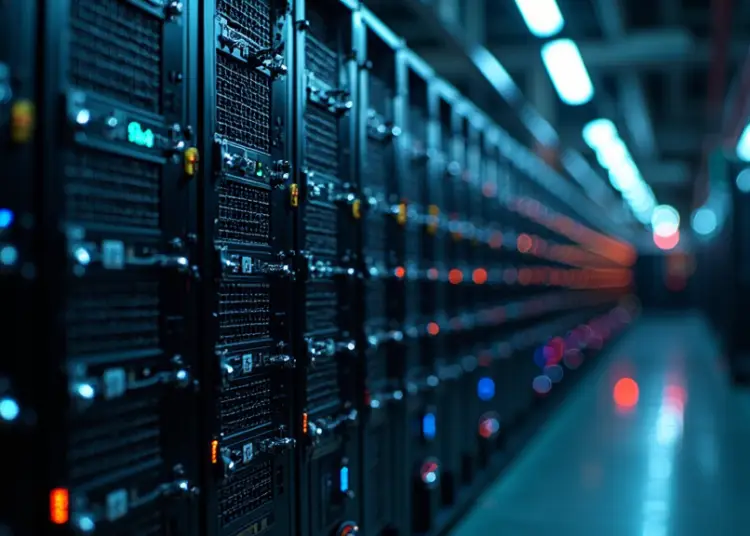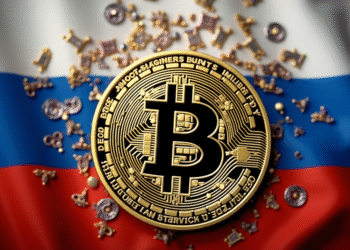Bitcoin ASICs have become a cornerstone of the cryptocurrency mining landscape, particularly as the demand for efficient mining solutions surges. Recently, Bitmain, a leader in the crypto mining equipment sector, announced an expansion of its production line to the United States. This strategic move comes in response to significant delays faced by US Bitcoin miners in receiving their ASIC chips, which have been stuck at ports for weeks. With Bitmain holding a commanding 90% market share in Bitcoin miners, this expansion is poised to enhance supply chain efficiency amidst escalating trade tensions between the US and China. As the cryptocurrency market evolves, the availability of advanced ASIC technology will play a crucial role in shaping the future of Bitcoin mining.
The term ‘Bitcoin ASIC’ refers to application-specific integrated circuits designed specifically for mining Bitcoin, which has revolutionized the way cryptocurrencies are mined. Recently, prominent manufacturer Bitmain has shifted its focus towards North America, aiming to alleviate supply chain disruptions affecting Bitcoin miners. This expansion of production capabilities underscores the importance of specialized mining hardware in optimizing crypto mining operations. With the rising importance of efficient mining solutions, terms like crypto mining equipment and ASIC chips have become increasingly relevant in discussions about the Bitcoin ecosystem. As the market adapts to regulatory changes and trade dynamics, understanding these key components will be essential for investors and miners alike.
Bitmain’s Strategic Expansion to the United States
In a significant move to enhance its operational efficiency, Bitmain has announced the expansion of its production line to the United States. This strategic decision comes in response to the increasing delays faced by US Bitcoin miners who have experienced extended waits for their orders of Bitmain’s ASIC equipment. By establishing a production presence in North America, Bitmain aims to streamline its supply chain and reduce the waiting time for delivery, which is crucial for miners looking to remain competitive in a volatile market.
The expansion is not just about logistics; it represents a broader trend of companies seeking to localize production amidst rising trade tensions between the US and China. With over 44.3% of the Bitcoin network’s hash rate concentrated in North America, Bitmain’s move is poised to strengthen its foothold in a region that is becoming increasingly important for Bitcoin mining operations. This initiative will allow Bitmain to better serve its North American clients and respond swiftly to market demands, ultimately enhancing the overall efficiency of crypto mining activities in the region.
The Impact of Trade Tensions on Bitcoin Mining
Recent trade tensions between the United States and China have significantly impacted the Bitcoin mining industry, particularly affecting the delivery of essential crypto mining equipment. Reports indicate that US ports have seen delays in the arrival of Bitmain’s ASIC machines, leaving many miners waiting for up to two months to receive their orders. Such disruptions in the supply chain highlight the vulnerabilities that arise from international trade relationships, especially for industries heavily reliant on specific manufacturers.
As the US government implements stricter export controls and tariffs, the implications for Bitcoin miners could be profound. The ability to access critical equipment like ASIC chips is vital for maintaining competitive mining operations. Consequently, the expansion of production facilities in the US not only addresses immediate supply chain issues but also positions Bitmain to navigate the complexities of international trade while ensuring that US miners have timely access to the latest technology.
Bitmain’s Role in the Bitcoin Mining Ecosystem
Bitmain has solidified its position as a key player in the Bitcoin mining ecosystem, primarily through its innovative design of application-specific integrated circuit (ASIC) chips. Holding an impressive market share of approximately 90% in Bitcoin miners, the company is instrumental in providing the necessary hardware that powers the network. The introduction of the Antminer S21 Pro miners is expected to deliver significant performance improvements, further reinforcing Bitmain’s dominance in the crypto mining equipment market.
The importance of high-quality ASIC chips cannot be understated in the context of Bitcoin mining, where efficiency and performance are paramount. As miners compete for block rewards, the capability of their hardware can determine their profitability and sustainability. Bitmain’s commitment to innovation and expansion underscores its critical role in supporting the growth of the Bitcoin mining sector, especially as it adapts to the changing regulatory and economic landscape.
The Future of Bitcoin Mining in the US
The future of Bitcoin mining in the United States appears promising, especially with companies like Bitmain ramping up local production. As more miners establish operations in North America, the potential for innovation and technological advancement in the sector is likely to increase. Moreover, the concentration of hash rate in the US and Canada suggests a robust infrastructure that could support further growth and investment in Bitcoin mining.
In addition to enhancing production capabilities, the US has become a focal point for discussions around energy consumption and sustainability in Bitcoin mining. The ambition of former President Trump to promote domestic Bitcoin production aligns with the growing awareness of energy use in crypto mining. By focusing on renewable energy sources, US miners could not only reduce their carbon footprint but also position themselves as leaders in environmentally responsible mining practices.
The Role of ASIC Miners in Cryptocurrency
Application-specific integrated circuit (ASIC) miners play a pivotal role in the cryptocurrency landscape, particularly in Bitcoin mining. These specialized devices are designed to perform a single task—mining Bitcoin—more efficiently than general-purpose hardware. With their ability to achieve higher hash rates with lower power consumption, ASIC miners have become the preferred choice for serious crypto miners looking to maximize their returns on investment.
As the difficulty of Bitcoin mining increases, the importance of utilizing advanced ASIC technology cannot be overstated. Miners equipped with the latest ASIC chips from manufacturers like Bitmain are better positioned to compete in the market, ensuring they remain profitable in an ever-evolving environment. The continuous development of more powerful and efficient ASIC miners is essential for the growth and sustainability of the Bitcoin network.
Navigating Supply Chain Challenges in Crypto Mining
The ongoing supply chain challenges faced by Bitcoin miners have highlighted the need for a more resilient infrastructure within the crypto mining sector. With delays in receiving essential equipment like ASIC miners, many operations have struggled to maintain their competitive edge. Bitmain’s decision to expand its production line to the US represents a proactive approach to mitigating these challenges and ensuring that miners can access the equipment they need in a timely manner.
To navigate these supply chain obstacles, miners may need to diversify their sourcing strategies and explore partnerships with local manufacturers. By fostering a more localized supply chain, Bitcoin miners can reduce their reliance on international shipping routes, which are often susceptible to delays and disruptions. This shift could ultimately enhance the stability and efficiency of the mining industry as a whole.
The Importance of Efficiency in Bitcoin Mining
Efficiency is a critical factor in the success of Bitcoin mining operations. As the network becomes more competitive, miners must continually optimize their processes to maximize profitability. The introduction of advanced ASIC miners, such as those produced by Bitmain, allows miners to achieve higher output with lower energy consumption, which is essential given the rising costs of electricity.
Furthermore, operational efficiency extends beyond just the hardware used; it also encompasses the overall management of mining facilities. By utilizing effective monitoring systems and adopting best practices in cooling and energy management, miners can enhance their operational efficiency and ensure that they remain competitive in a rapidly evolving market.
Potential Challenges Ahead for Bitcoin Miners
Despite the promising developments in the Bitcoin mining sector, several challenges loom on the horizon. Regulatory scrutiny is increasing, particularly regarding energy consumption and environmental impact. As governments around the world consider stricter regulations on crypto mining, miners must be prepared to adapt their practices to remain compliant while also maintaining profitability.
Additionally, fluctuations in Bitcoin prices can significantly impact mining operations. When prices drop, many miners may find it difficult to cover their operational costs, leading to potential scaling back or even halting of operations. Staying agile and responsive to market changes will be crucial for miners aiming to weather these challenges and thrive in the long term.
The Competitive Landscape of Crypto Mining
The competitive landscape of crypto mining is rapidly evolving, driven by technological advancements and the increasing demand for Bitcoin. Major players like Bitmain play a significant role in shaping this landscape, particularly through the development of cutting-edge ASIC miners that provide a competitive advantage. As new entrants emerge in the market, established companies must continue to innovate and enhance their offerings to retain their market share.
Moreover, the concentration of mining power in specific regions, such as the US and Canada, indicates a strategic advantage for miners operating in these areas. The availability of resources, favorable regulatory environments, and access to advanced technology contribute to the attractiveness of these markets. As the competition intensifies, miners will need to leverage all available resources to optimize their operations and remain leaders in the crypto mining industry.
Frequently Asked Questions
What are Bitcoin ASICs and why are they important for Bitcoin mining?
Bitcoin ASICs, or Application-Specific Integrated Circuits, are specialized hardware designed specifically for mining Bitcoin. They offer significantly higher efficiency and performance compared to general-purpose hardware like CPUs or GPUs. This efficiency is crucial for Bitcoin mining, as it directly impacts the profitability and speed of mining operations.
How has Bitmain’s expansion in the US affected Bitcoin ASIC availability?
Bitmain’s expansion of its production line to the US aims to enhance the availability of Bitcoin ASICs for North American miners. This strategic move is expected to minimize delays previously experienced due to trade tensions and shipping issues, ensuring a more reliable supply of crypto mining equipment.
What impact do trade tensions between the US and China have on Bitcoin mining equipment?
Trade tensions between the US and China have led to delays in the delivery of Bitcoin ASICs from manufacturers like Bitmain. These delays can hinder the operations of US Bitcoin miners who rely on timely access to this critical mining hardware.
What is the significance of the Antminer S21 Pro release by Bitmain?
The release of the Antminer S21 Pro marks a significant advancement in Bitcoin mining technology, providing miners with improved efficiency and hashing power. This new model is part of Bitmain’s efforts to maintain its market dominance in the production of Bitcoin ASICs.
Why are ASIC chips considered the best choice for Bitcoin miners?
ASIC chips are considered the best choice for Bitcoin miners due to their superior performance and energy efficiency. These chips are specifically designed for Bitcoin mining, allowing miners to achieve higher hash rates while consuming less power compared to other types of mining hardware.
How does Bitmain’s market share influence the Bitcoin mining industry?
Bitmain holds a substantial market share in the Bitcoin mining industry, with estimates suggesting it commands up to 90% of the market for Bitcoin miners. This dominance allows Bitmain to influence pricing, technology advancements, and the overall availability of Bitcoin ASICs in the market.
What challenges do US Bitcoin miners face with ASIC equipment deliveries?
US Bitcoin miners have faced challenges such as delayed deliveries of ASIC equipment due to customs and port issues. These delays have led to longer wait times for essential mining hardware, impacting the operational capabilities of many mining businesses.
How does the concentration of Bitcoin mining in the US affect the market?
The concentration of over 44.3% of the Bitcoin network’s hash rate in the US and Canada indicates a strong presence of Bitcoin miners in this region. This concentration can lead to increased competition among miners and can influence the overall dynamics of Bitcoin mining profitability and strategy.
What role do tariffs play in the future of Bitcoin ASIC imports?
Potential tariffs on imports, as discussed by US officials, could affect the cost and availability of Bitcoin ASICs in the US. Increased tariffs may lead to higher prices for mining equipment, impacting the profitability of Bitcoin mining operations in the country.
| Key Point | Details |
|---|---|
| Bitmain Expansion | Bitmain expands its production line to the US to enhance supply chain efficiency. |
| US Miners’ Delays | US Bitcoin miners have faced delays in receiving Bitmain ASICs stuck at ports. |
| Market Share | Bitmain holds up to 90% market share in Bitcoin miners. |
| New Product Launch | The first batch of Antminer S21 Pro miners will be released soon. |
| Trade Tensions | Increased trade restrictions between the US and China are affecting supply chains. |
| US Mining Dominance | 44.3% of Bitcoin’s hash rate is concentrated in the US and Canada. |
Summary
Bitcoin ASIC technology is critical for the cryptocurrency mining industry, and the recent expansion of Bitmain’s production line to the United States signifies a strategic response to increasing supply chain demands and trade tensions with China. By establishing operations in the US, Bitmain aims to deliver faster services to its North American customers while addressing delays that have plagued US miners. This move not only highlights the dominance of Bitcoin ASIC manufacturers but also underscores the growing importance of local production in the face of international trade challenges.













